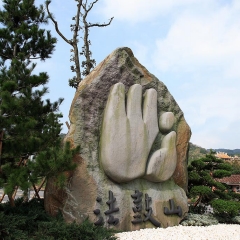Introduction

Master Sheng Yen, founder of Dharma Drum Mountain, dedicated decades of his life to spreading the Buddhadharma globally and guiding Chan practice, sharing Buddhist compassion and wisdom with people around the world. His idea of Protecting the Spiritual Environment has been widely valued and recognized internationally.
Based on the Master's infinite compassionate vows, Dharma Drum Mountain's branch monasteries and practice centers worldwide have been promoting
Three-fold Education and
Four Kinds of Environmentalism, endeavoring to help purify human minds and society, in hopes of sowing the seeds of world peace through joint efforts to realize the goal of
"building a pure land on earth."
Ideas and Applications
 The Common Ethos of Dharma Drum MountainOur vision: to uplift the character of humanity and build a pure land on earth.
The Common Ethos of Dharma Drum MountainOur vision: to uplift the character of humanity and build a pure land on earth.Dharma Drum Mountain strongly believes that to uplift humanity's character, including moral integrity. The one must start by correcting one's own views and behavior. When everyone's character is raised, this world will naturally become a pure land
Our spirit: to give of ourselves for the benefit of all.If we all think only of fulfilling ourselves and do not want to contribute anything, unrestrained selfish competition will plunge society into disorder. If we can give of ourselves for the self-fulfillment of others, then everyone will benefit, as we ourselves will also grow in wisdom and blessings.
Our direction: to return to the original intention of the Buddha and work for the purification of the world.Imitating the Buddha's kindness and compassion, we hope that everyone can start with themselves to study the Dharma, propagate the Dharma, and uphold the Three Jewels, so as to purify society, the mind, and the world.
Our approach: to promote comprehensive education and extend loving care to all.Only by providing education and cultivating talent of all types in a systematic, comprehensive manner can we attract people to Buddhism as it is understood correctly. Education and loving care are two sides of the same coin: loving care is the function of education.
The Three Types of Education
 1.Education through Academics
1.Education through AcademicsEducation through Academics aims to provide comprehensive, humanistic education to nurture the talents for building a pure land in the human realm.
Academics:
Dharma Drum Institute of Liberal Arts DILA—resembles the word 'delight,' which resonates with our wish to create a campus where one may find delight in the Dharma.
More ...Chung-Hwa Institute of Buddhist Studies Our roots are Chinese, our branches are global.
Our specialty is Buddhist Studies, and
our aim to uphold orthodox Buddhism.
We combine understanding with practice, and
join compassion with wisdom.
Practicality is our priority, and benefiting others is our emphasis.
More ... Dharma Drum Sangha University Compassion, wisdom, harmony, and respect — the university
motto, represents not only the spirit of Dharma Drum
Sangha University, but also the qualifications and principles a
monastic should possess and observe..
More ...
 2. Education through Public Outreach
2. Education through Public OutreachEducation through Public Outreach helps to uplift humanity through traditional cultivation and modern education.
3.Education through Caring ServicesEducation through Caring Services promotes living in accordance with Buddhism: caring for and respecting every stage of life, promoting a compassionate and humanistic society.
Dharma Drum Mountain Social Welfare and Charity Foundation Protecting, fulfilling, achieving sentient beings
A thousand arms to protect, a thousand eyes to perceive
Dharma Drum Mountain’s charitable activities originated in 1956, when Master Sheng Yen’s teacher , Ven. Master Dong Chu, in the spirit of Buddhist compassion, started winter-time relief activities aimed at low-income families enabling underprivileged social groups to enjoy the Chinese New Year season.
More...
Four Kinds of Environmentalism
 1. Protecting the Spiritual EnvironmentProtecting the spiritual environment means keeping our mind stable and pure
1. Protecting the Spiritual EnvironmentProtecting the spiritual environment means keeping our mind stable and purePollution in the environment is mostly man-made and human behavior is dependent on human mind. If we practice spiritual environmentalism with sincerity, humility, and loving-kindness, if everyday we clear our mind of unwholesome thoughts, we would lift the character of humanity and live in a pure land.
PracticesChan Meditation
The Fivefold Spiritual Renaissance Campaign
2. Protecting the Natural EnvironmentProtecting the natural environment means maintaining the co-existence and co-prosperity of the whole earth community From the Buddhist point of view, the natural environment everywhere is the home village to sentient beings, and everything in the environment is needed for the livelihood of some sentient being or other. The whole earth is the common resource that current and future generations rely and subsist on. The faster we deplete earth's resources the sooner we destroy it. We therefore call on everyone to cherish our blessings, protect and sustain the earth's water and natural resources by careful usage, nonpolluting and not wasting.
PracticesRecognizing blessings
Cherishing blessings
Nurturing blessings
Sowing the seeds of blessings
3. Protecting the Living Environment Protecting the living environment means keeping our life orderly and simple Our needs are little; our wants are great. Take only what we need, and what we want is unimportant. In our daily life, cultivate the habits of contentment and few desires, diligence, leanness, and tidiness. Do not waste energy and resources and minimize the generation of garbage and pollutants.
PracticesOur wants are many
Our needs are few
Pursue only what you can and should acquire
Never pursue what you can't and shouldn't acquire
4. Protecting the Social EnvironmentProtecting the social environment means being dignified and humble in society Courtesy must arise in the mind and manifest in behavior; it is not just a formality. Protecting the social environment starts with individuals: being dependable, taking responsibility, and behaving properly. Through purifying the actions of our body, speech and mind, we can purify ourselves as well as society
PracticesThe Six Ethics of the Mind
Buddhist-Style Joint Weddings
Buddhist-Style Joint Birthday Celebration for the Elderly
Buddhist-Style Joint Natural Funerals
DDM's vision is to "uplift the character of humanity and build a pure land on earth,to be achieved through concrete programs for The Three Types of Education. In "the Common Ethos of Dharma Drum Mountain," the phrase "to promote comprehensive education" refers exactly to The Three Types of Education. And "to extend loving care to all" is practiced through the four kinds of environmental protection: protecting the spiritual environment, protecting the social environment, protecting the living environment, and protecting the natural environment.
The Fivefold Spiritual Renaissance Campaign
The Fivefold Spiritual Renaissance Campaign
---A Proposition for Living in the Twenty-first Century
1. Four Fields for Cultivating Peace:
---A Proposition for Uplifting the Character of Humanity
Cultivating a peaceful mind lies in reducing desires
Cultivating a peaceful body lies in hard work and thrift
Cultivating a peaceful family lies in love and respect
Cultivating peaceful activity lies in being honest and upright
2. Four Guidelines for Dealing with Desires:
---A Proposition for Living a Carefree Life
Our needs are few
Our wants are many
Pursue only what you can and should acquire
Never pursue what you can’t and shouldn’t acquire
3. Four Steps for Handling a Problem:
---A Proposition for Resolving the Difficulties of Life
Face it: face the difficulty squarely
Accept it: accept the reality of the difficulty
Deal with it: deal with the difficulty with wisdom and compassion
Let it go: afterwards, let go of it
4. Four Practices for Helping Oneself and Others:
---A Proposition for Getting Along with Others
Feeling grateful for the chance to develop
Feeling thankful for the opportunity to hone your practice
Reforming yourself through the Dharma
Influencing others through virtuous action
5. Four Ways to Cultivate Blessings:
---A Proposition for Increasing Blessings
Recognizing blessings is the greatest happiness
Cherishing blessings is the best way of saving
Nurture blessings, and you’ll always be blessed
Sow the seeds of blessings that blessings may be shared by all
The Six Ethics of the Mind
The Six Ethics of the MindFamily Ethics
Living Ethics
School Ethics
Environmental Ethics
Workplace Ethics
Ethics between Ethnic Groups
The Common Endeavor of Buddhists
 Have faith in the Buddha, follow the Dharma, respect the Sangha;
Have faith in the Buddha, follow the Dharma, respect the Sangha;
The Three Jewels are a bright lamp shining throughout eternity.
Uplift the character of humanity
And build a pure land on earth
Being grateful, repaying kindness: this is first;
Benefit others and you benefit yourself.
Foremost is to exert your wholehearted effort
Without measuring more or less.
Kindness and compassion have no enemies,
And wisdom engenders no vexations.
The busy make the most of time;
The diligent enjoy the best of health.
In broadly sowing the fields of merit,
Why fear any hardship or rebuke?
Those who give selflessly are blessed;
Those who do good deeds are happy.
In every moment feel the joy of the Dharma,
And abide in the bliss of meditation.
Recite “Guanyin Bodhisattva” everywhere
And chant “Amitabha Buddha” without end.